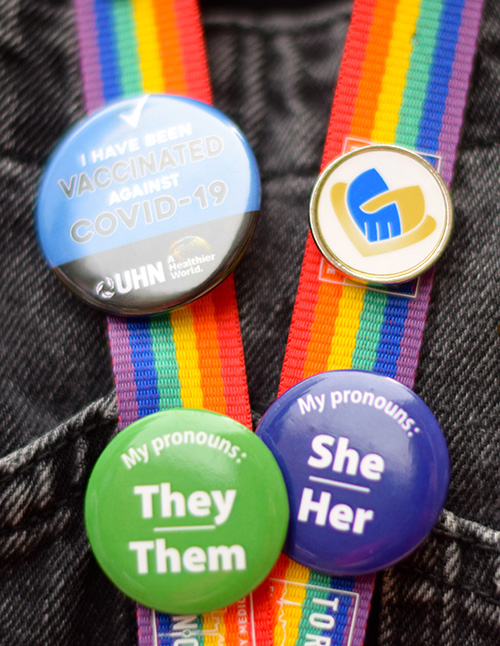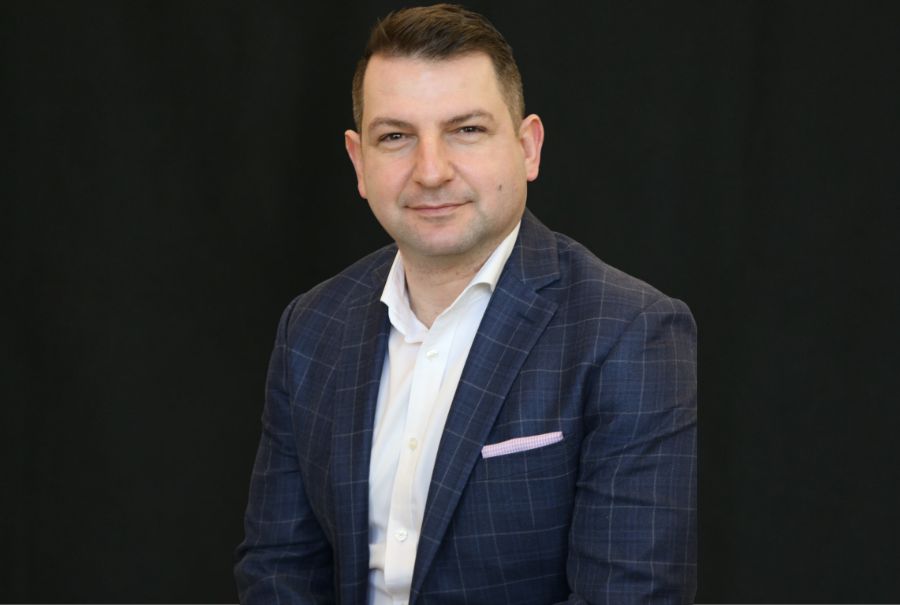Kirsten Engelbrecht, co-Chair of the UHN 2SLGBTQIA+ Committee, prepares to raise the Pride flag outside Toronto General Hospital to celebrate June as Pride Month. (Photo: UHN)
Synapse go-live is here – and so, too, is Pride Month.
University Health Network (UHN) began using a new health information system (HIS) from Epic on June 4, marking a major milestone in UHN’s clinical transformation. The implementation project was code-named Synapse to symbolize the interconnections created when there’s a single source of truth about each patient’s medical journey.
As part of the roll-out for the new system, information on sexual orientation and gender identify (SOGI) can be included in patients’ records.
The launch coincides with Pride Month, an occasion rooted in activism that celebrates the 2SLGBTQIA+ community.
“Pride Month at UHN is an opportunity to highlight and celebrate the beautifully diverse and often invisible community that plays a crucial role in making UHN a worldwide leader in health care,” says Kirsten Engelbrecht, a registered vascular technologist at the Peter Munk Cardiac Centre and co-Chair of the UHN 2SLGBTQIA+ Committee.
The SOGI-related information that patients can provide, if they want, includes the patient’s preferred name, sex assigned at birth, gender, sexual orientation, and pronouns.
“The most immediate change patients will notice is that their preferred name is now the most visible name in their UHN health record,” Alaina Cyr, a resource development specialist for UHN Patient Education and Engagement and co-Chair of the UHN 2SLGBTQIA+ Committee.
“The benefit of this modification is that, it will be difficult for UHN staff to accidentally use the wrong name if a patient doesn’t go by their legal name.”
Alaina was part of the small working group that advocated for refinement of all SOGI-related queries in Epic, ensuring the options listed in drop-down menus included a wide variety of options spanning the diverse identities and meeting the needs of the 2SLGBTQIA+ community.
Recognizing that aspects of individual identity can change or evolve over time, patients will also have the ability to update their SOGI information at any time, either through the myUHN Patient Portal or by asking a member of their health care team.

The new information represents an important step forward in acknowledging and respecting the identities and health care needs of 2SLGBTQIA+ patients at UHN.
Factors related to 2SLGBTQIA+ identities can have direct implications for medical care and also represent important social determinants of health; this information could therefore help to improve care for these patients. It is critical for 2SLGBTQIA+ to receive respectful care, as the patient experience can influence short-term and long-term health outcomes.
Alaina says while the SOGI-related changes in the new HIS are needed improvements, “this is just the start and there is plenty more work to do.”
Members of the working group are aware that some of the language within the SOGI-related questions require changes and are advocating for improvements in future updates.
“For example, in the gender-identity question, we are advocating to replace the terms ‘female’ and ‘male’ with ‘woman’ and ‘man,’ and to allow patients to select multiple genders instead of just one,” Alaina says.
Alongside the changes in Epic, the UHN 2SLGBTQIA+ Committee has been busy working on several other initiatives.
The committee recently collaborated with the UHN Research Inclusion, Diversity, Equity, and Accessibility (IDEA) Committee on a Pronoun Campaign, which also launches during Pride Month.
As part of the campaign, pronoun stickers and buttons are available to members of TeamUHN. They can be affixed either to an ID badge or to a lanyard, will include “She/Her,” “He/Him,” “They/Them,” and “Ask Me” options, as well as a blank option to allow individuals to write their own pronouns.
The idea for the Pronoun Campaign was originated by Dr. Alya Heirali, a postdoctoral fellow at Toronto General Hospital Research Institute and the Staff/Trainee Lead of the Research IDEA Committee.
“As a woman with intersecting identities in academia, sometimes others make assumptions about me, some of which are negative and stereotypical,” says Dr. Heirali.
“Experiencing these microaggressions motivated me to educate others in my work and learning environment to foster mutual understanding and respect. The Pronoun Campaign is one step towards taking personal accountability to creating safe, respectful and inclusive spaces.”
Making UHN a more inclusive space for all individuals under the 2SLGBTQIA+ umbrella
Kirsten, the 2SLGBTQIA+ Committee co-Chair, has also worked to ensure that Pride flags are raised across all UHN sites.
“Seeing the Pride flags raised across UHN sites sends the primary message that UHN is committed to do the work of being inclusive and creating a safe space for all that come through the doors,” she says.
There is, of course, much more work necessary to actually foster and nurture safe spaces across UHN.
“As we celebrate Pride Month, it is so important to remember that these celebrations arose from protests and the fight for two-spirit, lesbian, gay, bisexual, transgender and all members of our community to exist day to day without persecution,” Kirsten says.
The efforts of the 2SLGBTQIA+ Committee are rooted in this spirit of activism, and a commitment to making UHN a more inclusive space for all individuals under the 2SLGBTQIA+ umbrella.
Other recent efforts from the 2SLGBTQIA+ Committee have centered on expanding educational resources for TeamUHN members that are available through the committee’s SharePoint webpage. These include content on effective allyship, supporting colleagues, providing inclusive care, and a page on Epic-related resources.
The webpage content is actively reviewed and updated to expand the educational materials that are available. The committee has also created an informational brochure for trans and non-binary patients on what to expect at UHN and the services that are available for these individuals.
June is also National Indigenous History Month across Canada. The 2SLGBTQIA+ Committee, in collaboration with the Indigenous Health Program (IHP), is working towards organizing joint educational events to highlight experiences of navigating health care while embodying intersecting identities of oppression.
An upcoming virtual session hosted by the IHP and 2SLGBTQIA+ Committee titled “Identity: Understanding Who You Are & Where You Come From” will be held on June 23. More details of events and registration will be made available through the committee’s SharePoint webpage.
The 2SLGBTQIA+ Committee can be contacted at [email protected].
The UHN 2SLGBTQIA+ Committee acknowledges and commits to the principles of IDEA (inclusion, diversity, accessibility and anti-racism) and the UHN IDEA team. The committee reaffirms solidarity with the Indigenous Health Program, the Black Legacy Committee, the Accessibility Advisory Committee, the Pan Asian Committee and UHNWomen.


